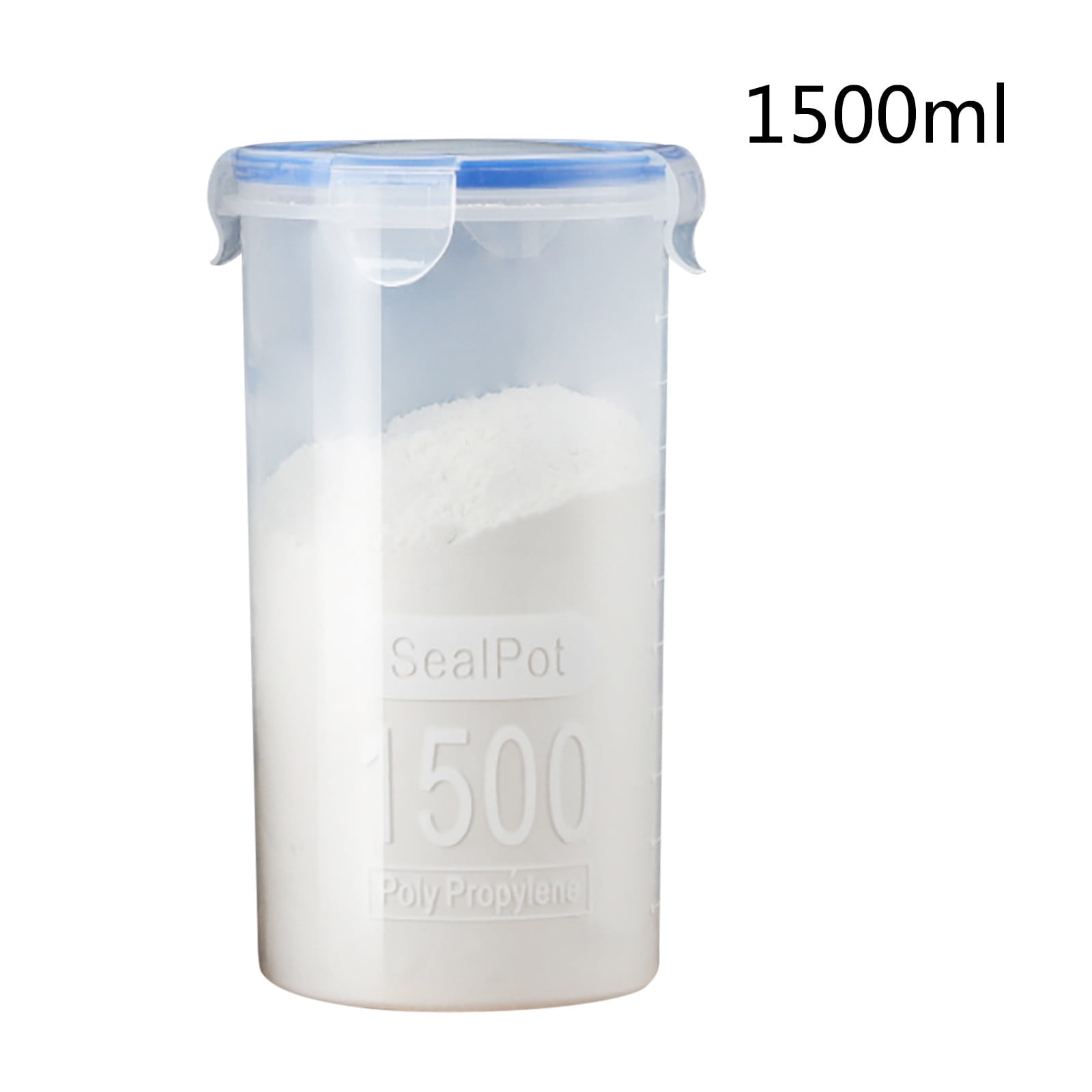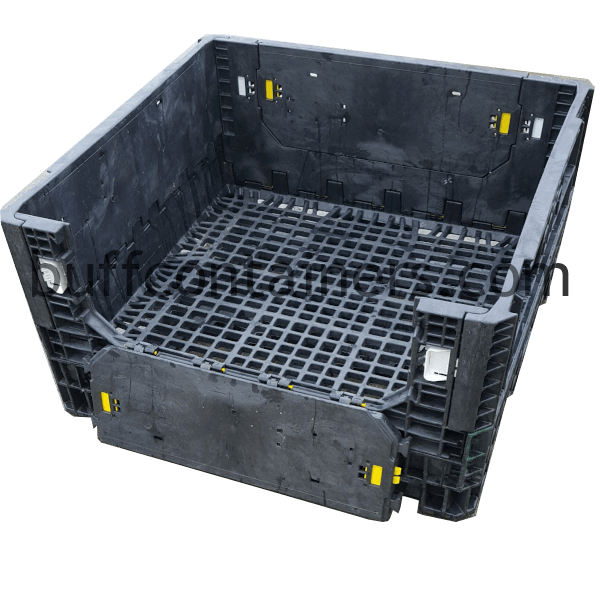A Comprehensive Guide to the Various Kinds of Mass Plastic Containers Available Today
Mass plastic containers play an important duty in different markets, providing options for storage and transport. Their varied types accommodate different demands, from rigid alternatives for solid products to flexible containers fitting numerous shapes. Each type offers distinct benefits, making it important to comprehend their applications and attributes. As markets advance, so do the demands for effective container services. What variables should one consider when selecting the ideal mass container?
Introduction of Mass Plastic Containers

Sorts Of Bulk Plastic Containers
Bulk plastic containers been available in different kinds, each matched to specific applications. Rigid mass containers, versatile mass containers, and intermediate mass containers stand for the key groups, each offering one-of-a-kind advantages. Comprehending these types is essential for choosing the appropriate container for transferring and keeping products.

Stiff Mass Containers
Inflexible mass containers are essential for effective storage space and transport of numerous products throughout industries. These containers are usually built from sturdy plastics, allowing them to withstand harsh handling and ecological problems. They come in numerous shapes and sizes, including totes, bins, and drums, making them appropriate for saving every little thing from granular materials to fluids. Inflexible containers frequently feature strengthened wall surfaces and safe covers, ensuring the components stay protected throughout transit. Their stackable design maximizes storage space, making them ideal for stockrooms and producing facilities. Additionally, numerous inflexible mass containers are recyclable and recyclable, adding to sustainability initiatives. In general, their robustness and versatility make inflexible bulk containers an essential part in supply chain operations.
Adaptable Mass Containers
Adaptable bulk containers, often referred to as flexible intermediate bulk containers (FIBCs), act as a versatile option for saving a range and transferring of completely dry materials. These containers are typically made from woven polypropylene and are made to be light-weight yet solid, enabling efficient handling and stacking. Their adaptability enables them to accommodate numerous sizes and shapes, making them appropriate for items ranging from grains to chemicals. FIBCs can be furnished with attributes such as spouts for easy filling and discharge, in addition to safety coatings for improved durability. Additionally, they are recyclable and multiple-use, adding to lasting methods in sectors like farming, food handling, and building. On the whole, flexible mass containers offer a economical and efficient option for bulk product administration.
Intermediate Mass Containers
Intermediate bulk containers (IBCs) are important for the effective transportation and storage space of liquids and granular materials throughout various markets. These containers typically have an ability ranging from 275 to 330 gallons and are made for simple dealing with and piling. Made from durable materials like high-density polyethylene or steel, IBCs offer exceptional defense versus contamination and ecological aspects. Their style includes functions such as a built-in pallet for forklift gain access to and a detachable top for simple dental filling and cleansing. IBCs are extensively utilized in chemical, food, and pharmaceutical sectors, making sure compliance with safety regulations. Their versatility and reusability make them a cost-effective service for bulk storage and transport, adding to provide chain performance and sustainability.
Features and Benefits of Mass Plastic Containers
Bulk plastic containers are necessary tools in numerous sectors, supplying a mix of longevity and usefulness. These containers are constructed from top quality materials, making them resistant to influences, chemicals, and ecological aspects. This toughness warranties item security during storage space and transport.
Furthermore, bulk plastic containers are lightweight, facilitating convenience of reducing and taking care of shipping prices. Their stackable style makes the most of storage space performance, enabling for enhanced storage facility room. Lots of designs include safe covers or closures, offering an impermeable seal that prevents and maintains materials contamination.
Bulk plastic containers are recyclable and typically recyclable, contributing to sustainable methods. Their versatility allows for a large array of applications, from food storage space to industrial usage, improving their worth throughout industries. Organizations take advantage of the lengthy life-span and low upkeep demands of these containers, making them a cost-efficient service for both short-term and lasting needs.
Industries That Utilize Mass Plastic Containers
Various sectors benefit from making use of mass plastic containers, each leveraging their unique buildings for details applications. The food and drink sector counts on these containers for secure storage you could try this out space and transportation of products, while the chemical production field uses them for managing unsafe products. In addition, the pharmaceutical distribution requires stress the significance of durability and cleanliness in product packaging remedies.
Food and Drink Market
As the demand for safe and efficient storage remedies continues to climb, the food and drink industry increasingly counts on mass plastic containers for their functional requirements. These containers offer robust, lightweight, and functional alternatives for storing active ingredients, completed products, and waste materials. Made from food-grade products, they ensure conformity with wellness and security standards. Various styles, such as stackable bins and tote boxes, maximize space throughout transport and storage space, enhancing logistical performance. Additionally, the transparency of some bulk containers permits very easy inventory monitoring, minimizing the danger of perishing. With the market's emphasis on sustainability, lots of manufacturers are currently offering multiple-use and recyclable choices, lining up with environmentally friendly techniques while fulfilling the high demands of food safety and health.
Chemical Manufacturing Field
The chemical manufacturing field relies greatly on bulk plastic containers for the reliable and safe storage space of basic materials, intermediates, and completed items. These containers are developed to stand up to numerous chemicals, guaranteeing that harmful materials do not leak or break down the container itself. Usual types include high-density polyethylene (HDPE) and polypropylene containers, which offer outstanding chemical resistance and sturdiness. Their light-weight nature and stackable design help with transport and storage, enhancing area in manufacturing centers. In addition, numerous bulk plastic containers feature attributes such as tamper-evident seals and easy-to-read labeling, enhancing security and conformity with Go Here sector regulations. In general, mass plastic containers are indispensable to the chemical manufacturing process, offering trusted solutions for managing varied materials.
Drug Distribution Needs
Pharmaceutical distribution relies upon bulk plastic containers to satisfy rigid safety and regulatory requirements. These containers are essential for transferring and storing a variety of pharmaceutical products, including energetic pharmaceutical ingredients (APIs) and completed medications. Their design assurances protection versus contamination, moisture, and light, maintaining the stability of sensitive materials. In addition, bulk plastic containers are compliant with market standards such as Great Production Practices (GMP) and are commonly made from materials that are FDA-approved. The usage of these containers enhances performance in the supply chain, permitting for secure, large-scale circulation while decreasing waste. Firms in the pharmaceutical industry prioritize the use of durable, watertight, and tamper-evident containers to assure item security and high quality throughout click here to find out more the logistics process.
Considerations for Picking the Right Container
When picking the appropriate mass plastic container, different variables should be meticulously evaluated to guarantee perfect functionality and safety. The nature of the materials to be stored is extremely important; compatibility with the container's material can affect stability and safety. Bulk Plastic Containers. Additionally, the container's size and form must line up with the storage space and transport demands, assuring reliable space application
Tons ability is another important factor to consider, as it should fit the weight of materials without danger of damages or failure. The style attributes, such as venting or lids, can impact use and access. Conformity with sector policies is necessary, especially in markets like pharmaceuticals, where security standards are stringent.
The expected life expectancy and toughness of the container should be assessed to confirm it fulfills the functional demands without constant replacement. By assessing these factors, one can choose one of the most appropriate bulk plastic container for specific applications.
Ecological Effect and Sustainability
As businesses increasingly prioritize sustainability, the ecological impact of bulk plastic containers has actually come under scrutiny. These containers, typically made from materials such as polyethylene or polypropylene, contribute substantially to plastic waste otherwise managed correctly. Their manufacturing includes the intake of fossil gas, which can result in boosted greenhouse gas exhausts. Nevertheless, developments in recycling innovation and the advancement of naturally degradable choices are assisting to mitigate these worries.
Furthermore, many producers are embracing methods that highlight the use of recycled materials, thus minimizing the need for virgin plastics. The longevity of bulk plastic containers likewise contributes; they are designed to be recycled several times, which can minimize their overall environmental footprint when contrasted to single-use options. Ultimately, the sector deals with the challenge of stabilizing capability with environmental responsibility, making lasting practices crucial for the future of mass plastic containers.
Finest Practices for Storage Space and Transportation
Efficient storage space and transport of mass plastic containers substantially affect both functional performance and sustainability. To optimize room, organizations ought to pile containers firmly, ensuring security and avoiding damage. Correct labeling is important for simple recognition, which enhances retrieval procedures. Furthermore, preserving a orderly and tidy storage space location reduces the risk of contamination and enhances safety and security.
For transportation, choosing the appropriate vehicle is crucial; containers should be safeguarded to avoid moving throughout transit. Firms ought to also consider making use of pallets to promote simpler loading and discharging. Normal assessments of containers for wear and tear can prevent pricey substitutes.
Temperature control is an additional essential element, as severe problems can jeopardize the integrity of the plastic. Training personnel on best methods for dealing with and transport warranties compliance and advertises a culture of security. By implementing these ideal techniques, organizations can improve their operational performance while adding to ecological sustainability.
Regularly Asked Concerns
Exactly how Do I Clean Mass Plastic Containers Properly?
To clean bulk plastic containers properly, one ought to wash them with cozy water, utilize a mild detergent and scrub with a soft brush. Rinse thoroughly, then allow to air dry completely prior to storage space or reuse.
What Is the Lifespan of Mass Plastic Containers?
The lifespan of bulk plastic containers generally ranges from 5 to 10 years, depending upon the product, usage, and ecological conditions. Proper maintenance and storage space can considerably prolong their functionality and sturdiness over time.
Can Bulk Plastic Containers Be Personalized?

Do Bulk Plastic Containers Have Guarantee Options?

Exist Regulations for Using Mass Plastic Containers?
Yes, guidelines exist for using bulk plastic containers, mainly concentrated on safety and security, ecological effect, and product compliance. These regulations ensure that containers meet industry requirements and are appropriate for delivering numerous materials safely and successfully.
Inflexible mass containers, flexible bulk containers, and intermediate mass containers represent the primary classifications, each offering unique benefits. Versatile bulk containers, usually referred to as flexible intermediate mass containers (FIBCs), offer as a functional solution for storing a variety and moving of completely dry materials. The chemical production market counts greatly on mass plastic containers for the reliable and secure storage space of raw products, intermediates, and finished items. plastic bulk containers. These containers are developed to endure different chemicals, ensuring that dangerous products do not leakage or deteriorate the container itself. Furthermore, bulk plastic containers are certified with market requirements such as Great Production Practices (GMP) and are commonly made from materials that are FDA-approved